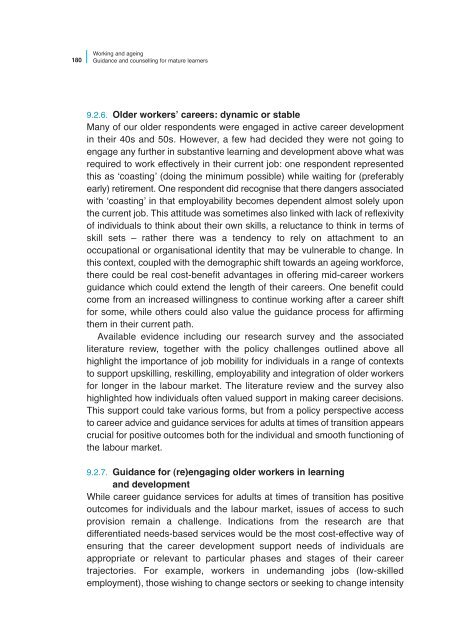Working and ageing - Cedefop - Europa
Working and ageing - Cedefop - Europa
Working and ageing - Cedefop - Europa
You also want an ePaper? Increase the reach of your titles
YUMPU automatically turns print PDFs into web optimized ePapers that Google loves.
180<br />
<strong>Working</strong> <strong>and</strong> <strong>ageing</strong><br />
Guidance <strong>and</strong> counselling for mature learners<br />
9.2.6. Older workersʼ careers: dynamic or stable<br />
Many of our older respondents were engaged in active career development<br />
in their 40s <strong>and</strong> 50s. However, a few had decided they were not going to<br />
engage any further in substantive learning <strong>and</strong> development above what was<br />
required to work effectively in their current job: one respondent represented<br />
this as ʻcoastingʼ (doing the minimum possible) while waiting for (preferably<br />
early) retirement. One respondent did recognise that there dangers associated<br />
with ʻcoastingʼ in that employability becomes dependent almost solely upon<br />
the current job. This attitude was sometimes also linked with lack of reflexivity<br />
of individuals to think about their own skills, a reluctance to think in terms of<br />
skill sets – rather there was a tendency to rely on attachment to an<br />
occupational or organisational identity that may be vulnerable to change. In<br />
this context, coupled with the demographic shift towards an <strong>ageing</strong> workforce,<br />
there could be real cost-benefit advantages in offering mid-career workers<br />
guidance which could extend the length of their careers. One benefit could<br />
come from an increased willingness to continue working after a career shift<br />
for some, while others could also value the guidance process for affirming<br />
them in their current path.<br />
Available evidence including our research survey <strong>and</strong> the associated<br />
literature review, together with the policy challenges outlined above all<br />
highlight the importance of job mobility for individuals in a range of contexts<br />
to support upskilling, reskilling, employability <strong>and</strong> integration of older workers<br />
for longer in the labour market. The literature review <strong>and</strong> the survey also<br />
highlighted how individuals often valued support in making career decisions.<br />
This support could take various forms, but from a policy perspective access<br />
to career advice <strong>and</strong> guidance services for adults at times of transition appears<br />
crucial for positive outcomes both for the individual <strong>and</strong> smooth functioning of<br />
the labour market.<br />
9.2.7. Guidance for (re)engaging older workers in learning<br />
<strong>and</strong> development<br />
While career guidance services for adults at times of transition has positive<br />
outcomes for individuals <strong>and</strong> the labour market, issues of access to such<br />
provision remain a challenge. Indications from the research are that<br />
differentiated needs-based services would be the most cost-effective way of<br />
ensuring that the career development support needs of individuals are<br />
appropriate or relevant to particular phases <strong>and</strong> stages of their career<br />
trajectories. For example, workers in undem<strong>and</strong>ing jobs (low-skilled<br />
employment), those wishing to change sectors or seeking to change intensity

















